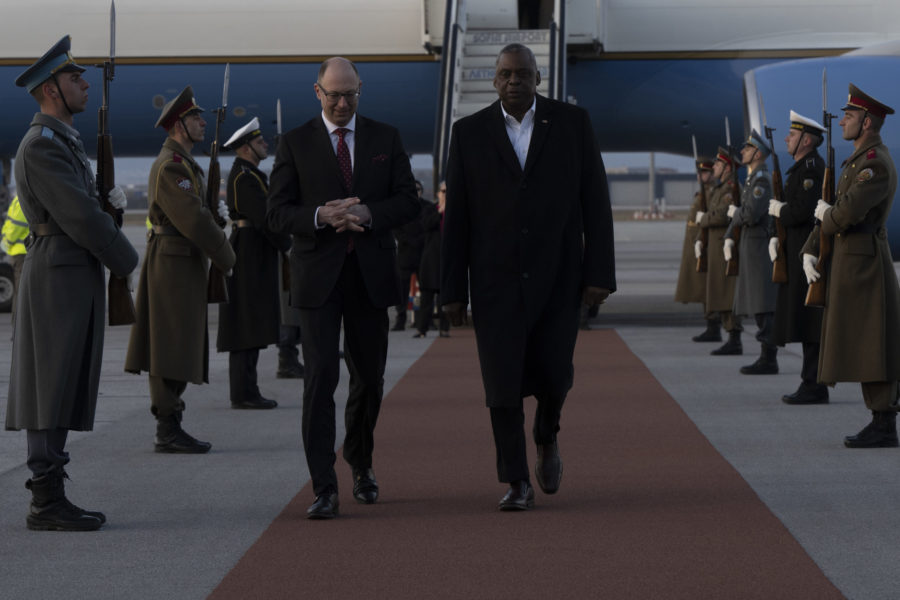Bulgaria is one of the Eastern European countries that possesses the S-300 air defense systems that Ukrainian President Volodymyr Zelensky has said are urgently needed to repel Russia’s air assault. The Black Sea NATO ally also has the same Soviet-era MiG-29 and Su-25 fighters used by the Ukrainian Air Force.
But Bulgaria also depends on Russian gas, and so far Bulgarian Prime Minister Kiril Petkov has refused lethal assistance to Ukraine and ruled out transferring its jets.
The delicate dynamic is what Defense Secretary Lloyd J. Austin III faces in meetings in Bulgaria from March 18 to 19.
Austin landed at Bezmer Air Base near the Black Sea coast March 18 and was greeted by the Bulgarian defense minister and chief of defense before visiting with American troops. The U.S. maintained about 200 troops in Bulgaria before the arrival of a Stryker brigade from Germany. Austin was expected to hold meetings with his Bulgarian counterpart and to meet with Petkov just as Russia expanded its cruise missile attacks on the once-safe western part of Ukraine.
“In the West, reports of missile strikes in the vicinity of Lviv International Airport appear to be accurate,” a senior defense official told reporters in a statement.
Russia began striking air bases and a military training center in western Ukraine on March 11.
The Pentagon assesses that Russia remains “largely stalled across the country” but has effectively isolated major cities, including Chernihiv and Mariupol, which have suffered humanitarian disasters amid indiscriminate bombing and shelling of civilian targets.
Russia has launched more than 1,080 missiles since the start of the war.
In a March 16 address to the U.S. Congress, Zelensky specifically asked for help acquiring S-300 missile defense systems and fighter jets. Getting those from Bulgaria will be a tough sell, a Bulgarian defense official told Air Force Magazine.
“The official position of the government is no military support, just humanitarian,” the official said. “But let’s see what’s going on in the next couple of days or weeks.”
Petkov began his term in office in December 2021. An anti-corruption crusader who founded his own party, he took office only after forming a delicate coalition government whose factions include a party sympathetic to ties with Russia.
“He’s quite keen to rely on NATO partners and NATO allies,” the official said. “But at the same time … the question is political because we have a coalition government.”
In October 2020, Bulgaria and the U.S. signed a 10-year roadmap to deepen defense ties and improve Bulgaria’s military readiness and capabilities. In the past five years, the U.S. has provided more than $160 million in security assistance to Bulgaria. Bulgaria has also purchased eight F-16s, but a recent Lockheed Martin production delay could mean Bulgaria’s air modernization may not happen until 2025.
Petkov has previously said Bulgaria doesn’t have enough combat aircraft to defend its own territory. On March 17, after a meeting with Austin, Slovakia’s Defense Minister Jaroslav Nad said his country would be willing to give up its S-300 and MiG-29s if replacements were provided.
To reassure NATO eastern flank allies, the U.S. moved two Patriot missile batteries from Germany to Poland, and the Netherlands repositioned a Patriot battery to Slovakia. Likewise, Bulgaria’s neighbor, Romania, possesses a Patriot battery, and NATO member Turkey has the Russian-made S-400 missile defense system.
The Bulgarian official said “it makes sense” that the missile defense capacity of both NATO ally neighbors could cover Bulgaria’s own small territory.
But Bulgaria has also been besieged by hybrid warfare and espionage threats from Russia. On March 18, Bulgaria expelled 10 Russian diplomats. A week prior, two Russian diplomats were expelled.
“It means something is going on,” the official said.
Meanwhile, supply routes from multiple Eastern European NATO allies continue to flow defense assistance into Ukraine, and the Pentagon assesses that the air space over Ukraine remains contested.
“The Ukrainian Air Force is continuing to fly aircraft and employ air and missile defense,” the senior defense official said.
Whether Ukraine receives the air defense systems it requires to keep its air space contested, or better protect civilian populations, may depend on the success of Austin’s latest European swing.

